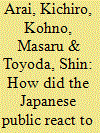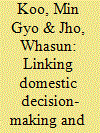|
|
|
Sort Order |
|
|
|
Items / Page
|
|
|
|
|
|
|
| Srl | Item |
| 1 |
ID:
118947


|
|
|
|
|
| Publication |
2013.
|
| Summary/Abstract |
This paper examines United States (US)-China trade disputes under the World Trade Organization (WTO) and argues that both countries are increasingly resorting to the WTO's dispute settlement mechanism to target issues of most critical concern to their respective domestic constituencies. While the United States' WTO complaints against China tend to challenge Chinese industrial policy, cases involving anti-dumping and countervailing duties dominate China's WTO disputes against the United States. In addition, the significant expansion of bilateral trade relations in the past decades has provided opportunities for Chinese leaders to identify or to threaten retaliation against anti-protectionist groups in the United States in order to mobilize them against the disputed measure. Overall, United States-China trade disputes under the WTO increasingly reflect a distinctive political logic whereby domestic political considerations not only figure prominently in the decision to launch WTO disputes, but also frequently influence the way the dispute is played out either within or outside of the WTO framework.
|
|
|
|
|
|
|
|
|
|
|
|
|
|
|
|
| 2 |
ID:
118950


|
|
|
|
|
| Publication |
2013.
|
| Summary/Abstract |
We present a comprehensive evidence on how the Japanese reacted to the sudden death of North Korea's Kim Jong Il in December 2011, which was an event of enormous significance for Japan's national security. Based on our original, partially panel-structured, multi-wave monthly surveys conducted from December 2011 to March 2012, we analyze how the Japanese learned about his death, how they formed evaluations about its implication, and how their perceptions changed over time. Our findings illustrate that Japan's general public reacted in a remarkably calm and balanced way to the evolving situation, pointing to a basic sense of realism that underlies their attitudinal orientation toward North Korea. This sense, we argue, derives from the confidence widely held in Japan that, while North Korea remains one of the crucial sources of external threats, its overall ability to influence the regional and international dynamics is limited and its threat thus containable within current framework of national security.
|
|
|
|
|
|
|
|
|
|
|
|
|
|
|
|
| 3 |
ID:
118948


|
|
|
|
|
| Publication |
2013.
|
| Summary/Abstract |
We develop an expanded two-level game analysis of trade negotiations between South Korea and the United States, with an emphasis on the important cases of beef and automobiles. The theoretical background of this study is that the chief negotiator is not always an honest agent with no independent motive. We find that small perceived win-sets during the beef and automobile negotiations in the 1990s created problems at the negotiation stage (as already predicted by Putnam), while large perceived win-sets during the Korea-US free trade agreement (KORUS FTA) negotiations produced unexpected, but eventually resolved, problems at the ratification stage. Our analysis shows when and why larger perceived win-sets emerge in spite of the greater risk of failed ratification. During their bilateral negotiations in the 1990s, trade negotiators' autonomy, both in South Korea and in the United States, was institutionally weak, and their policy ideas were subordinated to mercantilism or fair-trade ideas, thus creating small perceived win-sets. By contrast, the empowerment of the Office of the Minister for Trade in South Korea after 2004 and the provision of trade promotion authority in 2002 to the US Trade Representative institutionally strengthened chief negotiators' autonomy vis-à-vis KORUS FTA negotiations, thus producing large perceived win-sets. During this period, the chief negotiators' autonomy, combined with their free-trade ideas, as well as with their own institutional interests, made the domestic constituency's win-set as perceived by chief negotiators larger than a Putnam's two-level game analysis would have predicted. The ratification of the KORUS FTA, albeit prolonged much longer than anyone expected, illustrates that the chief negotiators did not 'incorrectly' perceive their win-sets to be larger than they actually were.
|
|
|
|
|
|
|
|
|
|
|
|
|
|
|
|
| 4 |
ID:
118946


|
|
|
|
|
| Publication |
2013.
|
| Summary/Abstract |
More than three decades have passed since Deng Xiaoping opened China to the outside world with a series of sweeping economic reforms. Yet, before China entered the World Trade Organization (WTO) in 2001, even at the height of free trade in the 1990s while lowering trade barriers overall, the Chinese government continued to protect some industries. This article explores the cross-industrial variation in trade protectionism in the 1990s, when the Chinese government was negotiating for accession to the WTO. It demonstrates that the major incentive of the Chinese government for trade protectionism was political, involving such factors as the state sector's inefficiency, the ease with which workers could organize to rebel, and bureaucratic organizations' pressure on the government on behalf of certain industries. The Chinese government chose to protect certain industries to prevent free trade from exacerbating social instability in the 1990s.
|
|
|
|
|
|
|
|
|
|
|
|
|
|
|
|
| 5 |
ID:
118949


|
|
|
|
|
| Publication |
2013.
|
| Summary/Abstract |
In this article, we consider how states wield shaming strategies to 'be green' and to try to influence other states to 'become green' - environmentally responsible states. We compare Australia-Japan relations in the international politics of whales and tuna, respectively, and show that only at the level of norms and identities, rather than material interests, can two seemingly contradictory behaviors be reconciled, where a country shames another in one case (whales) and deliberately spares it from shaming in another (tuna). We argue that each issue reveals two different ways in which Australia seeks to construct itself as an environmentally responsible state, following a 'preservationist' and a 'conservationist' paradigm, respectively. We thus contribute to the constructivist understanding of the role of norms of global environmental politics and of the links between norms, identities, and the choice of shaming as an instrument of foreign policy.
|
|
|
|
|
|
|
|
|
|
|
|
|
|
|
|
|
|
|
|
|